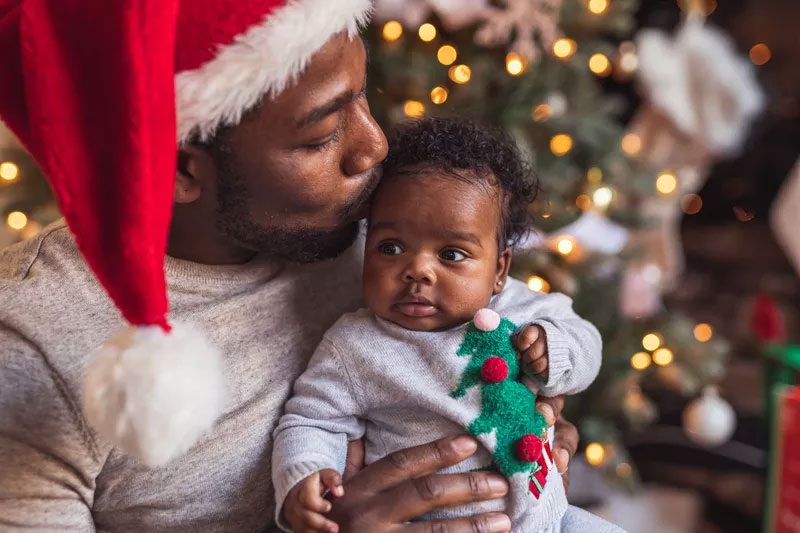How to Protect Your Newborn from COVID-19 During the 2021 Holidays
Updated on December 17, 2021

Key Takeaways
- Studies show that newborns are not as likely to get infected with COVID-19 as older children.
- However, young babies may be at higher risk for serious illness from COVID-19.
- It’s natural to be concerned about mixing with family and friends during the festive season, particularly if you have an infant at home.
- You can take many steps to help protect your little one from COVID-19, including holding social gatherings outdoors and asking visitors to get vaccinated.
If you’ve brought home a baby recently (or are preparing to), give yourself a massive high-five. Making the transition to parenthood—whether that’s by giving birth, through adoption, surrogacy, etc.—is challenging at the best of times. During pandemic times, it’s a whole other story.
Thanks to COVID-19, everything we do comes with new concerns and questions, and the holidays—a time we hope will be enjoyable and relaxing—are no exception. When you have a young baby at home, they’ll be at the forefront of your mind. Is it safe to have the usual stream of holiday visitors? What do I need to do to keep my baby safe? Here, we’ll answer questions about how to protect your newborn from COVID-19 this holiday season.
How Risky Is COVID-19 to an Infant?
COVID-19 has been detrimental for most. “[However], children have fared much better than adults during the pandemic,” says Jennifer Lighter, MD, hospital epidemiologist and pediatric infectious disease specialist at Hassenfeld Children’s Hospital at NYU Langone.
There is evidence to show the immune cells in infants and children are especially strong at killing SARS-CoV-2 early on in infection, compared to adults.1 A U.K. study, published in The Lancet, found that newborns are not as likely to get infected with COVID-19 as older children.2
Additionally, when pregnant individuals are vaccinated against COVID-19, antibodies reach the infant and protect them for their first few months of life, says Dr. Lighter, who was senior author on a recent study published in the American Journal of Obstetrics & Gynecology MFM.3 The researchers found that of 36 newborns whose mothers received either the Pfizer–BioNTech or Moderna COVID-19 vaccine during pregnancy, 100% of them had protective antibodies at birth.
However, should infants contract COVID-19, they may be at a higher risk of severe illness than older children.2 The reasons are three-fold, says Adrianna Bravo, MD, FAAP, pediatrician and senior medical advisor for Inspire Diagnostics: they are not age-eligible to be vaccinated yet, their immune systems are immature, and their lungs and airways are smaller.
Dr. Bravo understands why parents have concerns. “Nearly all of the families with infants and young children that we work with are expressing concern, especially as the holidays approach and families are weighing the risk and benefits of traveling and gathering together,” she says.
What You Need to Know About Protecting Your Newborn
If you’ve got a little one at home during the festive season, it’s natural to have all sorts of questions about the precautions you should take. Don’t worry—we’ve got it covered. Here’s what the experts say about protecting your littlest ones from COVID-19 during the holidays.
Should I Require Family Members To Be Vaccinated Before Seeing My Newborn?
An unvaccinated person poses a risk to everyone they come into contact with, warns Dr. Lighter.4 “Newborns can’t be separated from the rest of the family very easily and vaccinating all eligible household members acts as a cocoon for infants,” she says.
“Newborns can’t be separated from the rest of the family very easily, and vaccinating all eligible household members acts as a cocoon for infants.”
— JENNIFER LIGHTER, MD
That means checking the vaccination status of everybody who comes to your home during the holidays. “The take-home message is this: if you are going to be gathering with people outside of your household, even if they are family or close friends, it’s really important to know a little something about who you’re gathering with,” says Dr. Bravo.
Although we’re at the stage of the pandemic where we no longer have to stay home and avoid seeing other people, we’re not yet at the stage of a free-for-all. This is especially the case when infants are involved, says Dr. Bravo. “We must remember these newborns are vulnerable and unvaccinated.”
Should My Family Wear a Mask Around My Newborn?
Dr. Bravo says there is no one risk mitigation measure that is foolproof, but a multi-layered approach provides robust protection. At a minimum, she advises applying three foundational risk mitigation measures.
First, make sure everyone around the infant is vaccinated. Next, do your due diligence to ensure anybody gathering together doesn’t have any symptoms (however mild) of COVID-19, flu, or similar. Finally, she recommends wearing masks when gathered indoors—at least for periods of time when not eating, and certainly during close contact with the baby.
Vidya Mony, MD, pediatric infectious disease specialist at Santa Clara Valley Medical Center in San Jose, California, agrees. “Remember, there are many other respiratory viruses going around right now—not just COVID-19,” she says. “Any of these infections can be detrimental to a young infant.” In fact, Dr. Mony goes one step further and advises against letting visitors hug, kiss, or hold your infant, period.
Should I Move My Holiday Celebrations Outside Because of My Newborn?
Gathering outdoors is always a better option. This is because the air is constantly moving, explains Dr. Mony. “Indoors, the air is stagnant—so if a person coughs or sneezes there aren’t as many air exchanges to move these respiratory droplets around.”
The weather isn’t always suitable for outdoor socializing, so if you have to keep it indoors, there are things you can do to reduce the risk of COVID-19 transmission to your infant. First of all, make sure the space is well-ventilated—pop open those windows! Dr. Bravo suggests purchasing a room-sized air filter for the gathering space, but just be sure to check the room size it’s rated for.
You can also take regular breaks from the crowd to step outside, which means you’re opening and closing that backyard door and encouraging the changeover of air in the room.
Should I Take Any Precautions With Older Kids at School?
Older siblings bringing something home to your infant is always a risk. Again, the best advice the experts have for children age 5 plus is to get them vaccinated. “It’s never too late to vaccinate an eligible kid,” says Dr. Bravo.
“Ensure that your older child is always wearing a mask at school and teach frequent and appropriate handwashing at school and at home,” adds Dr. Mony. And if your older child gets sick, get them tested for COVID-19 and other respiratory viruses and try to keep them apart from your little one.
If you are going to be gathering with people outside of your household, even if they are family or close friends, it’s really important to know a little something about who you’re gathering with.
— ADRIANNA BRAVO, MD
Dr. Bravo points out that she is seeing great risk mitigation strategies being followed in so many of the schools she works with. “With vaccination, frequent testing, proper mask-wearing, comprehensive daily symptom checking, and other risk mitigation measures, we can increase the probability that older siblings aren’t bringing anything home,” she says.
Should I Ask Family Members To Quarantine Before Seeing My Newborn?
The Centers for Disease Control and Prevention (CDC) recommends quarantining if you’ve been in close contact with someone who has COVID-19—whether you have symptoms or not—unless you’ve been fully vaccinated.5
If you’re fully vaccinated, you don’t need to quarantine unless you have symptoms. However, the CDC advises getting a COVID-19 test 5-7 days after exposure, even if you don’t experience any symptoms. Plus, you should wear a mask indoors in public for 14 days following exposure, or until you test negative for COVID-19.5
If a family member is feeling sick or experiencing symptoms of COVID-19, they definitely shouldn’t visit your home, says Dr. Mony. And asking visitors to take the home antigen test before visiting, regardless of their vaccination status, is another protective step that certainly won’t do any harm.
“Quarantining is never a bad idea!” says Dr. Bravo. “I always say that it’s an integral layer of protection.”
What This Means For You
If you’re worried about taking your infant into your family or group gathering during the holidays, or having people visit your home, give yourself peace of mind by asking everyone to take a COVID-19 test beforehand, wear a mask, and avoid contact with the baby unless they’re fully vaccinated. And if anybody has symptoms of COVID-19, like fever, a new, persistent cough, or a loss or change to their sense of smell or taste, they should definitely give the gathering a miss.
Remember, you can set the “rules” for your household depending on what you’re comfortable with. Hopefully, family and friends will understand that the health of your baby comes first.


:max_bytes(150000):strip_icc():format(webp)/Claire_Gillespie_headshot-649830869f1e4a4ca8979b90a304ffa0.jpg)
